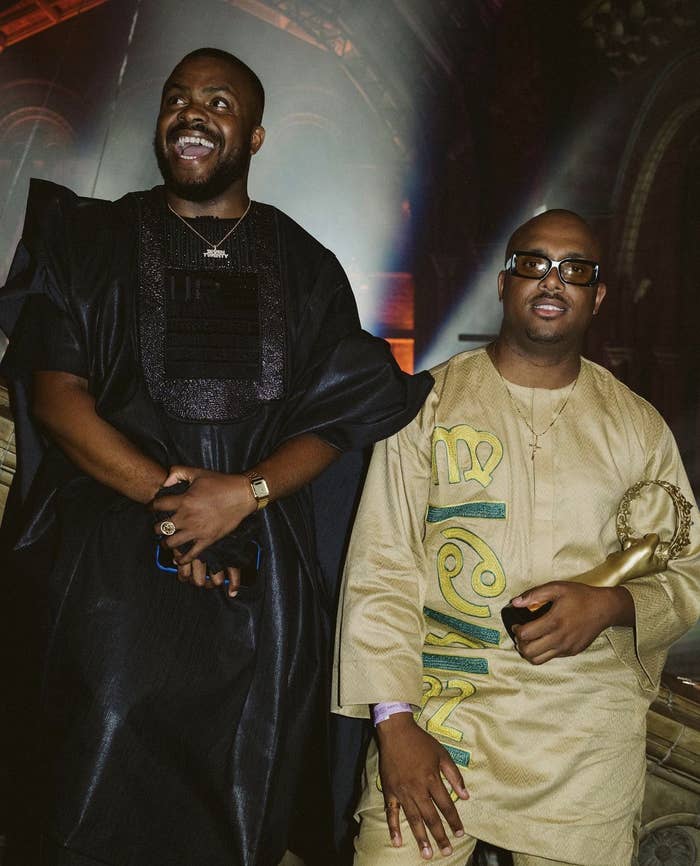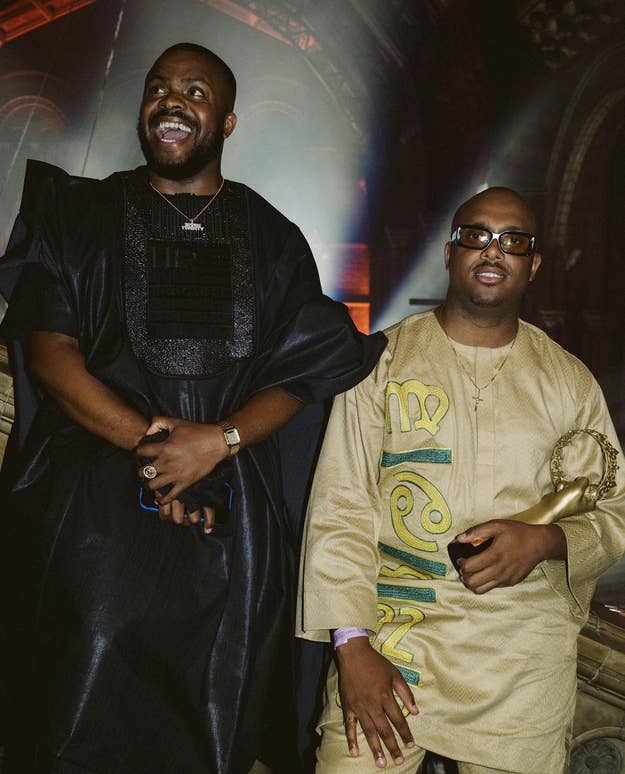
When most people think of London, they acknowledge it as being one of, if not the greatest city in the world—a melting pot, a creative hub of ingenuity, a place that breeds innovation. Such is exemplified in the Black British diaspora and its community—specifically in London—which in turn has helped create a unique space for Black diaspora worldwide to unite, exist, and become.
This is evident through the birth of grime, the reworking of Afrobeats, dancehall and more to produce Afroswing, the generations of Highlife, Hiplife, reggae, R&B, and all other trends of Black sounds that boomed throughout our homes, in hall parties and our hearts. Through our collective experiences, there’s a wide world of creativity and endeavour to capture and represent here, but we only ever get to a certain point.
In contrast to a USA that celebrates and upholds its differences, investing in new, creative trends, British people often opt for keeping things the same: stiff and old, with a polite tone to please. Just look at our award shows, punditry, and the regressive state of our outmoded media spaces—things could always be improved upon.
One creative duo (and their trusty team) on a mission to change the culture landscape forever are brothers Jojo and David Sonubi. Rising to fame during 2020’s lockdown, their online radio platform, No Signal, has been utilised as an extension of RECESS—their party brand which has encompassed Black nightlife and day parties since 2016. These are two ideas spawned through their company home, High Roller, a creative stable that takes inspiration from the American tenacity for inventiveness when it comes to their content.
Through No Signal, they amassed a worldwide spread of DJs that wanted to perform at Recess. They programmed a 12-hour daily radio station with their live or recorded sets rotating these DJs and adding more over the years; it platformed talk and review shows, played a worldwide range of genres, and generated content for many to engage with within their homes like their NS10v10. Eventually, the team’s prowess was displayed outside, with events like the Diaspora Dance, and RECESS continued to evolve in many capacities, collaborating with other brands like DLT, Adidas and Chocolate City in hosting nights in places such as Paris, Amsterdam, Ibiza, New York, and Accra.
On March 2, the RECESS team celebrated what seemed like a totality of Black British music. With over 10,000 partygoers filling the IKEA-turned-Drumsheds club venue, two rooms uniting DJs spanning over 20 years of this community’s musical evolution, and a several-song performance from Giggs, RECESS infers there is still so much more to be done. Recently, they announced the second RECESSLAND—another takeover of Margate’s famous Dreamland, which they did first upon their 100th party last year. Waves of Black partygoers flooded the Southeastern trains, or set off for the A2 and M2 at a good time, amassing over 7,000 people. As committed fans and first-timers plot on its second coming on Twitter, IG and TikTok, RECESS have hinted at more of its ventures planned this year, such as a return to Paris and Amsterdam.
We took a trip to High Roller HQ in Tottenham, North London, to talk with David and Jojo Sonubi about the team’s creative endeavours, including their always-anticipated NS Yearbook highlighting the best new music talent, parties both at home and abroad, and the state of London’s creative zone.
“One thing that we’ve always wanted to be known for, with all of our brands, is giving people a slice of London. People can really vibe out and also see what London creatives are into.” —David Sonubi
COMPLEX: What was the decision-making process behind the artists featured in the most recent No Signal Yearbook?
David Sonubi: As much as this is our taste, we also want the Yearbook to be a time capsule for music—then and there. Jazz is represented in it, dance music’s there too. Whatever genre it is, whatever lane you’re in, you’re on the winning team! It’s like an Olympic team: you could be playing basketball, throwing javelin or running 100m, you’re still a part of the Olympic team. We have to accommodate so many people and genres; there’s taste, then there’s facts to it. Some people have statistically done great, even if you don’t like what they’ve done. Their impact on what they’ve done is undeniable. People always question these artists, because they don’t know them. One person on the list might have 50 million streams and another person might only have half a million streams; it’s not necessarily about numbers, but if you’re talking about a specific thing, that person is a leader in their sound.
The NS Yearbook has evolved over time—what can you say of its different renditions?
David Sonubi: The Yearbook started with the UK for Year 1; Year 2 was UK artists as well. But with Year 3, we decided to take it international. There were two reasons for that. Firstly, the level of music in the UK was kind of mid—we saw it go down. We’re not talking numbers, we’re talking quality. I think there’s a lot of great talent in the UK, more great talent than what we think, and I always think it’s lazy when people say “UK music is shit.” It’s a lazy comment—you just don’t want to look past the people distributing the music. When we got to Year 3, we were struggling to find 10 solid UK artists. At the end of the day, we aren’t doing a ones to watch list; this is the best of the best. In 2022, for Year 3, even though before it was already undeniable, it was another great year for Afrobeats, so we had people like Ayra Starr feature in the list and Asake came through that year as well. There was just so much happening, but it came out great.
What do you hope this year’s collection shows?
David Sonubi: This ain’t some local campaign with locals doing it. No. This is competing with other big lists and other big things like this. There’s nobody doing this type of shit. Even to get artists to wear the same clothes, it can be hard sometimes and you have to fight for certain things. Thank God, they believed in us. For the most recent Yearbook, we linked up with Daily Paper and got all these artists to wear their tracksuits and T-shirts. We also made a newspaper to advertise the list, which was super cool. This campaign is one of the biggest lists in the world! That’s how I want the consumer to look at it.
When I think of No Signal, I think innovation, connectivity, and capturing culture. I think of a safe space, a broadening sense of Black culture and beautiful, timeless moments in life. This is me as a fan and appreciator of what you guys have produced for us, but what does No Signal see in itself?
David Sonubi: When we started No Signal, we never really sat down and said, “Okay. This is what we want No Signal to be.” It was more of a solution. There were so many DJs that wanted to play at RECESS and we couldn’t accommodate them at that time, in 2019. So we were like, “We have to create another platform where DJs can be free with the music they play, be it hip-hop, jazz, rock, R&B—they can play whatever they want.” With the pandemic, we had a party that got cancelled because everything got closed down, so it was like: “Cool. What do we do now? Ah! Let’s put that party online so the DJs who were meant to play can still play.” Again: another solution. As we started growing, we started to realise people were really locked in. Entertainment was at the centre of everything. And with the NS Yearbook campaigns, we wanted to show people that we can have our entertainment look as big as it is across the pond too. When we did our streams during the pandemic, people loved that we did credits at the end—like having High Roller Productions at the end with all the people who worked on it listed. People tweeted about that, specifically, saying it was really nice seeing the people working on it being recognised.
It made people realise that we took this thing seriously and treated it as credible entertainment. We had people tuning into our streams as if it was a big TV show! People from all over the world. I’ll always say this: the UK is the closest to most diasporan countries when it comes to culture, connection, and being proud of our heritage. We’re very close to Jamaica and the rest of the Caribbean. Very close to even Asia, in terms of the Indian diaspora. We have a lot of people proud of their heritage here—Africans and Arabs, especially—compared to other places in the world. When you look at Afrobeats artists, their first biggest show and tour is always in London and the UK. Caribbean artists as well. I’d say New York and Canada are definitely close with similarities to that of London. But in terms of championing? There’s no better city than London. America has so much on their plate for their cities and country, they don’t really look outside of what they need to do because they have everything there. So that’s why we created this from the beginning.
One thing I find so beautiful is that visitors and migrants from Africa, the Caribbean, Amsterdam, Paris, and even America—when they land here, they’re like: “What can I do? Where can I go to enjoy myself? What should I be doing?” And RECESS always gets mentioned as a must-attend. I’ve personally seen how transformative it has been for a foreigner attending one of your events. That must feel good.
David Sonubi: I love it! I’ve seen those questions pop up online as well and people in the comments will say, “Go to RECESS, and check out No Signal.” It’s super cool to see, man. One thing that we’ve always wanted to be known for—with all of our brands—is giving people a slice of London. People can really vibe out and also see what London creatives are into. And it’s not as if we’re talking about specific London cultures because there are lots of migrant stories, so we like to be in-tune with what’s happening across the diasporas too. Like, “Oh shit! You’re playing Lagbaja in a diasporan dance?” People don’t expect that. They’re coming here probably expecting to listen to grime and drill, which we do play, but we cater to a wider range of music lovers. For example, you could go to a hall party and they’re going to play dancehall music, reggae music, Celine Dion and Adele all mixed up in there. Only in London can you do that—a melting pot of cultures. That’s why Afroswing exists: it’s a mix of afrobeat, dancehall, rap. That is London.
Through RECESS and No Signal, you guys have created a community and unique space for Black partygoers, upholding cultures that we’re all invested in. How do you see the evolution of this party space from when you first started going out to now?
Jojo Sonubi: The Black nightlife sector has developed quite well. There’s a lot of different options, across different genres, and there are different parties and venues all over. Now you’ve got the day party, which is dominant, and obviously the brunches showing how much it’s grown. Especially in parts of the city we weren’t really frequenting, I’m just happy to see that and play a part in it.
“I hope the music coming out of this country aligns more with nightlife. I also feel like there’s a disconnect with the artists making themselves unavailable, hard to work with or pricing themselves out… I wish there was more alignment because some cool things can happen and these artists can benefit from the energy that nightlife is bringing.” —Jojo Sonubi
Within that evolution, what would you say we need to bring back, or rather: what’s missing?
Jojo Sonubi: Probably pre-social media era partying, when people actually partied and it wasn’t about going to parties for content purposes because, sometimes, it feels like people go to parties just to show that they were there. But we’re in a social media era right now, so it is what it is.
You both have such an intriguing perspective on our scene. When you see what’s been going on within it, can you highlight things you have recognised as revolutionary?
Jojo Sonubi: One moment that will always stick with me is when Skepta did his pop-up in Shoreditch in 2015. It was in a car park, and he announced it on the day and just pulled up which was revolutionary to me. It showed the power of the artist and the people who support them. Giggs did it in 2017 with Rinse FM and Timberland in Southbank outside the Mayor’s office, which was pretty cool. The rise of fashion brands in the city is really sick too, especially streetwear. The rise of different festivals is sick, even the birth of Amapiano and seeing how quickly the scene has spawned.
When you look at the other cities immersed in such culture, what are the trends you believe creatives from our side of the world should be adopting?
Jojo Sonubi: Each city has their own flavour. With Paris, they have such a deep culture of music—like French rap, music from the Francophone diaspora—and they love to dance and party hard. They don’t really seem to care about how they look as much as we do, which is something we can definitely adopt. Amsterdam doesn’t party as hard, but the quality of their DJs in terms of the craft is crazy because they make music and have so many sick producers making such great sounds. New York is another place I frequent more than any other city in Europe, apart from Amsterdam and Paris. It’s such a big space and is going through a transition, nightlife-wise. New York is quite similar to London; the only difference is how bold they are with their ideas and how they talk about their brands. It’s such an American thing to be bold and unashamed of your ideas. In the UK, we’re more conservative and try not to come across like we’re pushing our shit too much, but you have to push your shit and that’s something I want to implement in whatever I’m doing going forward.
How was it putting the RECESS x Drumsheds event together?
Jojo Sonubi: RECESS at Drumsheds was a challenge to convince our crowd that they should come to this massive venue that usually houses electronic music. We had to create desire by focusing our marketing on the theme of “London heritage and pride.” I really wanted to tap into the old notion of repping your ends, because it was going to be a massive congregation of people. Also, it’s one of the biggest parties for this generation of Black nightlife so it was better to focus on themes. In the event itself, I was happy to see the stage configuration work because I think it’s important to break up large dancefloors—whether it’s through platforms or creating pockets on the dancefloor. The programming went to plan as well, as it is very hard to keep thousands of people engaged, and I’m happy we were able to achieve largely positive reviews.
Things come in waves and, obviously, the ‘80s, ‘90s and early 2000s achieved a lot of things, especially the garage and jungle lot: they were doing a madness in Ally Pally around 2001—which is 10,000 people—just before grime was about to pop off. Nightlife is so sick right now; we should move more into the festival space, too, because there aren’t many options for Black music festivals, but it is growing. Now you have Across The Tracks and City Splash, and big up them because they’re independent. Amafest are also doing great things. For this generation, I want them to remember that it was great... I was there. I want them to feel something. I hope the music coming out of this country aligns more with nightlife, though. I also feel like there’s a disconnect with the artists making themselves unavailable, hard to work with or pricing themselves out. I wish there was more alignment because some cool things can happen and these artists can benefit from the energy that nightlife is bringing.
What do you guys have coming up?
Jojo Sonubi: RECESSLAND! We’re taking it step by step to get to the next goal and we hope everyone enjoys the ride.

